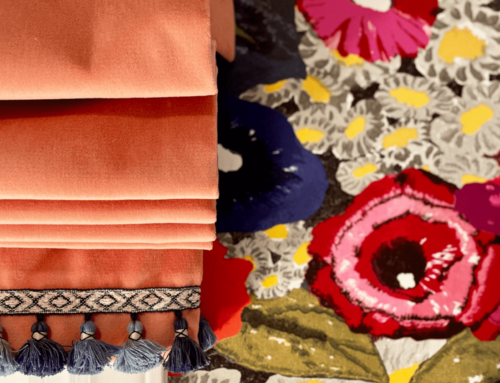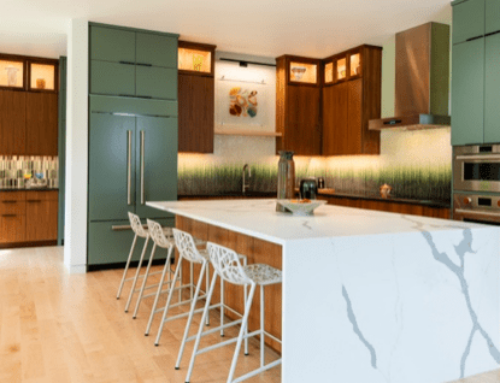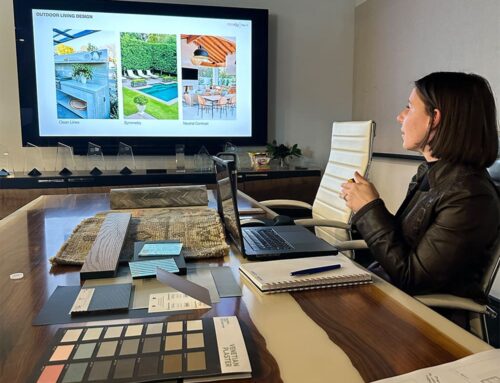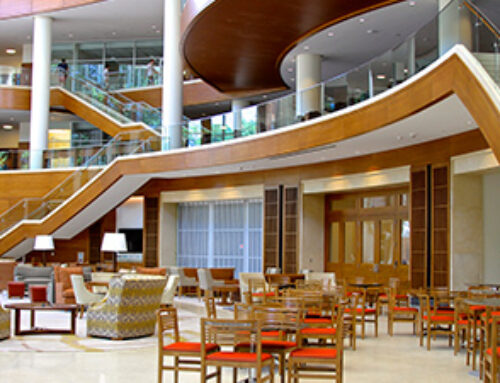Key Terms to Know
- Slab: A solid, rectangular surface from which your countertop is cut. This is the primary form you’ll select before it’s tailored to fit your space.
- Remnant: Any leftover material from the slab after your countertop is cut. These can often be used for smaller projects or accent pieces.
- Fabricator: The company responsible for cutting your slab into the precise dimensions of your countertop and installing it in your home. While some slabs can be purchased directly from the fabricator, you’ll find a broader selection at local stone distributors. Once purchased, the slab can be sent to your fabricator for cutting.
- Template: A layout drawn on your slab by the fabricator to designate the shape of your countertop, allowing you to verify which parts of the slab will be visible. This step is particularly important for slabs with distinct patterns.
- Leathered: A textured finish that gives the stone a soft, matte appearance with a slightly rustic feel.
- Honed: A matte finish with a smooth, flat appearance, offering a softer look compared to polished finishes.
- Polished: A glossy, reflective finish that enhances the stone’s natural colors and patterns.
Material Options
Quartz
- Consistency: Known for its consistent coloring, making it easier to match with your design scheme.
- Appearance: Can range from uniform to a more natural look, depending on the slab selection.
- Durability: Nearly indestructible and highly resistant to stains, scratches, and bacteria.
- Composition: Engineered from natural quartz and resin.
- Size: Slabs vary, but the average size is approximately 120” x 56”.
Granite
- Uniqueness: As a natural stone, every granite surface is unique with a vast array of colors and patterns.
- Durability: Highly resistant to everyday wear, scratches, and heat if properly sealed.
- Maintenance: Must be sealed upon installation and resealed periodically. To test if resealing is needed, place a few drops of water on the surface; if it absorbs quickly, it’s time to reseal.
- Pricing: Varies widely from budget-friendly to high-end options. If you fall in love with an expensive piece, consider enlisting a professional designer to help select the right one.
- Size: Slabs vary, with an average size of 9’-6” x 5’-6”.
Marble
- Elegance: A natural stone known for its timeless beauty and classic appeal. Marble offers unique veining and a luxurious finish.
- Characteristics: Softer than granite and quartz, making it more prone to scratches and stains but highly desirable for its aesthetic.
Soapstone
- Natural Beauty: Another natural stone, soapstone is valued for its smooth, matte finish and unique, subtle veining.
- Durability: Highly resistant to heat and staining, but softer than granite, making it susceptible to nicks and scratches that can be easily sanded out.
 By understanding these terms and material characteristics, you can better navigate your countertop choices and make a decision that fits both your aesthetic preferences and practical needs. Whether you opt for the consistency of quartz, the uniqueness of granite, the elegance of marble, or the natural beauty of soapstone, your countertop will be a stunning centerpiece in your home. Happy designing!
By understanding these terms and material characteristics, you can better navigate your countertop choices and make a decision that fits both your aesthetic preferences and practical needs. Whether you opt for the consistency of quartz, the uniqueness of granite, the elegance of marble, or the natural beauty of soapstone, your countertop will be a stunning centerpiece in your home. Happy designing!






